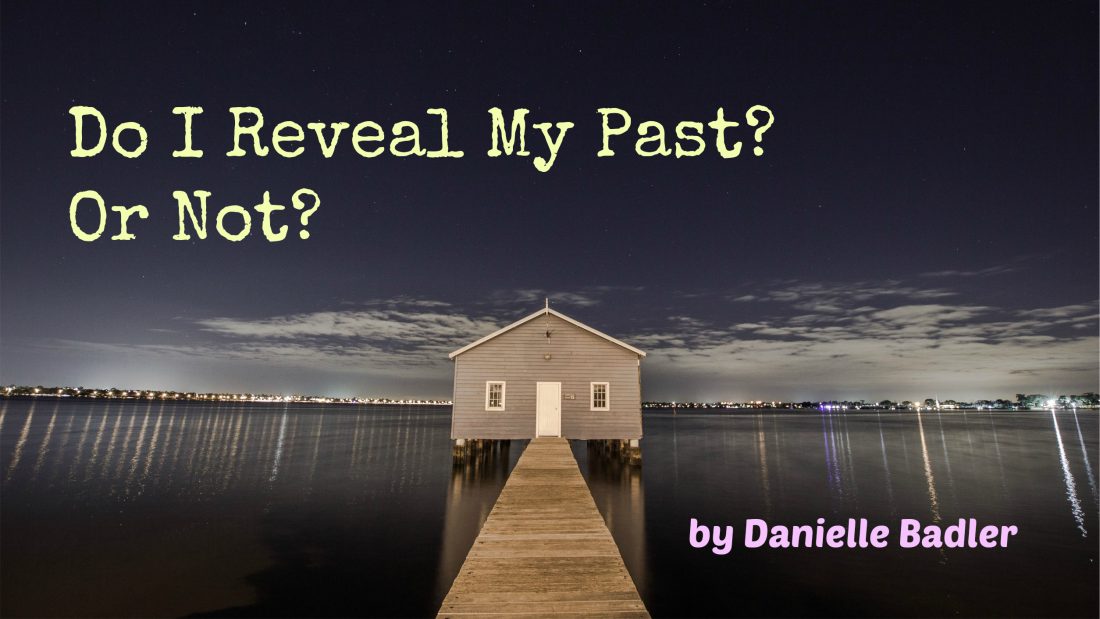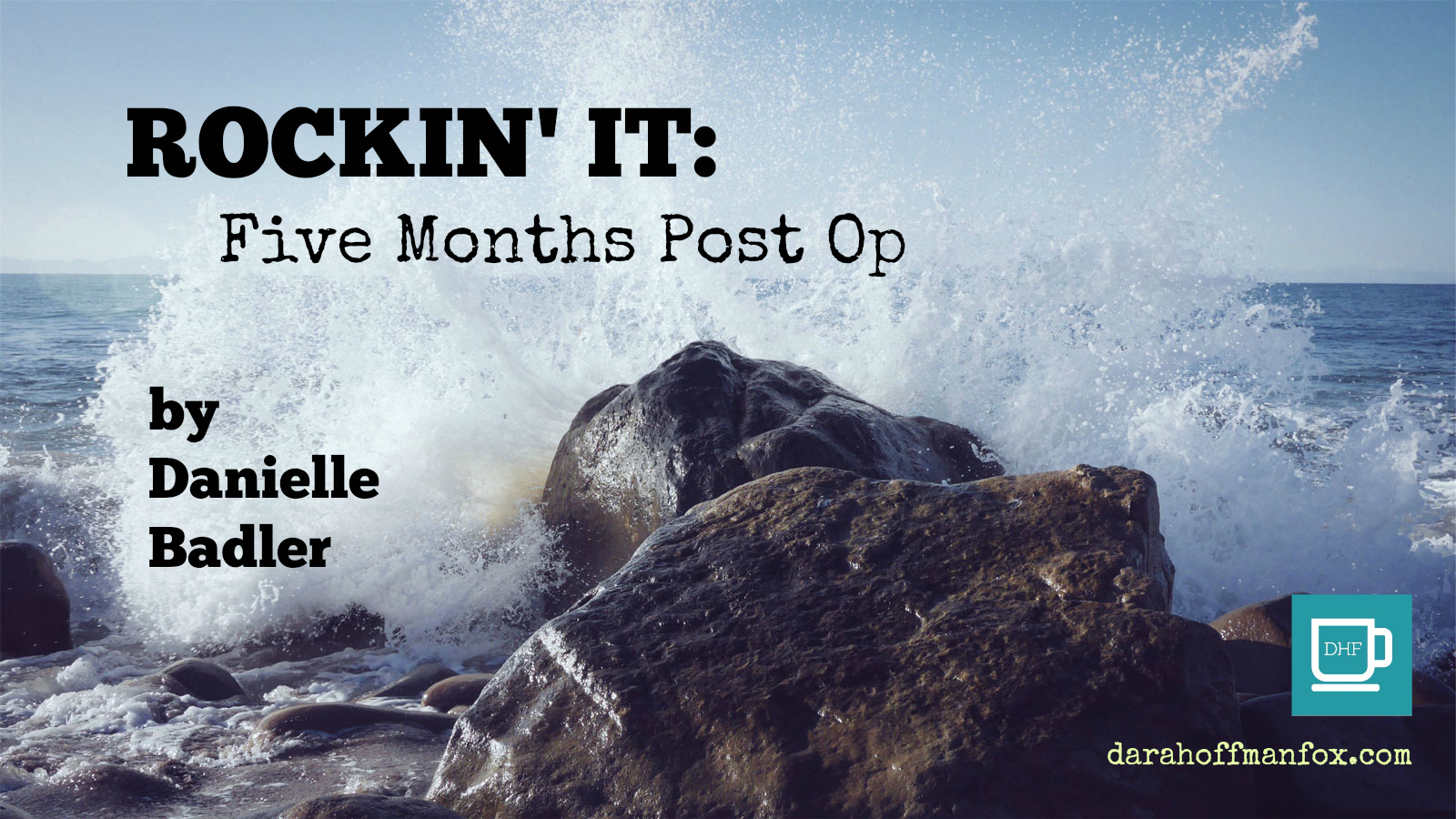
Do I Reveal My Past? Or Not?
Guest Post by Danielle Badler
I’ve run into this situation a number of times.
There I am, chatting away, and the conversation meanders into our respective pasts. Loves. Marriages. Kids. Work history. Places we’ve lived. Interests.
And, again and again, the dilemma raises its dirty little head…
Do I reveal my full past? Or not?
The problem is this. First there’s the issue of honesty, or lack thereof. Obviously.
The second is that, if I don’t, I’m not able to talk about the defining change I’ve gone through in my life. And I am then forced into a circumspect long way around my history, leaving out gigantic chunks of detail.
And there’s another element, the fact that I really do like talking about my transition, educating someone, especially if the person seems genuinely interested, and is a good audience.
And yet, the flip-side is also very powerful. If the conversation is legit, and I’m being accepted as me…and, believe me, I think I can usually tell…then that abject acceptance of me is also very, very satisfying. Deep down, I’m pinching myself. That little voice is yelling in my brain. “It’s working, it’s working. I am. I am accepted. Fully.”
It’s a rush. A powerful rush.
What to do?
For about nine months, I was friends with a woman who shared my love of independent film. Every two weeks or so, we’d meet, see a film and then go have dinner.
The conversation would generally run for two or three hours. We’d talk about life, loves, our past, our children, the sun, the moon, the stars.
This went on while I was preparing for my facial feminization surgery. And it turns out that she had a lot of experience in the matter. She described, in detail, what work she had had done. What to expect in convalescence. Her doctors’ techniques. Costs.
We had a falling out. I no longer see her. But that had nothing to do with our conversations. And, to this day, I have absolutely no idea whether she knew about my past. Early on, I thought about saying something. But I never did.
I’ve been in several other conversations, where we’ve covered our respective histories —where we’ve lived, what we did, how we’ve balanced family and work, and so forth.
In these conversations, I’ve been clear about my six relocations, living in Switzerland, the demands of corporate travel, stress in the workplace, stress on the family unit.
One time, I could see that the woman’s neurons were charging overtime. I could see she was trying to find order for the pieces that were rattling around in her brain. She asked me:
And you have two daughters? Yes.
And one was born in Switzerland? Yes.
And you were working full-time? Yes.
How did you do all this?
I was always the primary breadwinner, I said. We worked it out.
Oh.
And, with that, I ended the conversation. It was time for me to leave.
Should I have told her?
It happened again, today. I went on a three-hour hike with three other women.
One knew all about me. We had become good friends, and I told her a few months ago. I felt our friendship had reached a point where to not tell her was disingenuous and just plain awkward.
I don’t know what the second woman knew. She left us, half way through the hike. I talked extensively with the third, just about the entire length of the hike. She had no idea.
How do I know? Here’s how I know. She asked me, when I mentioned living in Switzerland, and these were her exact words, what my husband did.
Zap, pow, bang.
To answer her, I carefully chose my words. I said we moved around for my work. That that was the major motivation in our lives. That we tried to balance our lives that way.
I said nothing that was not truthful. But I obviously did not give the full story.
Should I have?
This past week I had a discussion with BFF Paige. I mentioned that I was considering creating a profile on on-line dating sites. Should I tell?
Not on your profile you don’t, she said.
Well, when?
After the second date, she said.
Why then? I said to her that my thought was I would tell, but not until I knew I would not get beaten up.
That’s reasonable, she said. But you do know that the person probably won’t call you again.
Well, that’s a risk I’ll take, when the time’s right, I said.
I think.
Author Bio
 New York native, Danielle Badler embarked on a writing and communications consulting career in early 2007, following more than 30 years in corporate communications, the last ten as the chief global communications officer for three Fortune 500 companies. That experience involved six corporate relocations, including a year in Lausanne, Switzerland.
New York native, Danielle Badler embarked on a writing and communications consulting career in early 2007, following more than 30 years in corporate communications, the last ten as the chief global communications officer for three Fortune 500 companies. That experience involved six corporate relocations, including a year in Lausanne, Switzerland.
Her work includes facilitating executive peer group meetings for The Conference Board in New York, as well as regular articles and columns for the Porsche Club of America, TFLCar.com and planet-9.com.
Danielle is also very active in community involvement, as the Board President of Alliance Francaise de Denver and a board member of the National Federation of Alliance Francaises, as well as a member of the Rocky Mountain Automotive Press Association. She is also on the Board of Directors for the GLBT Center of Denver.
A graduate of Case Western Reserve University, where she co-edited her college newspaper, Danielle now calls Denver home. She can be reached at rdbadler@gmail.com.






Bobbie Lang
March 11, 2015 at 5:53 PMTo tell or not to tell. I transitioned in the early 1980’s and I can certainly identify with this question. It was always extremely hard to engage in indepth conversations with someone whom you had great respect for, however, not knowing for sure if they could be trusted. On the few occasions when I did divulge my “secret” I was usually met with a positive reaction but out relationship always seemed to change. Where before I was accepted as a female friend I then became accepted as a transgender friend. There was a difference, whereas it was ok I much more prefer being treated as a female than a transwoman. I have learned and now I tell no one.
Jake
March 14, 2015 at 12:48 AMI think it’s complicated. If you don’t tell, then you are seen as cisgender, and if you do tell you are seen as trans, and probably not seen as, dare I say the “real” gender. Wanting to be seen as authentically of that gender that you are presenting as, that you feel inside, in your brain, heart, body, but most cisgender people will not see you as authentic after they know you are trans. We’re not cisgender, so we will not be seen as “real” by cis people, we need to validate our own “realness”. To be “real” in our own skin, that takes the power of our own “realness” back into our hands, transgender hands.
donohuema
March 14, 2015 at 6:19 AMThis is true about all aspects of intimacy, not just transgender issues. The transgender issues seem to be greater because gender is how so many people choose to relate to others. But the questions of do I share a mental health issue? Do I share a physical health issue? Do I tell someone my gender, my religion, my race, my ethnicity? What if I can “pass”? Should I never tell? At what point does not telling become a lie? If I tell with a bumper sticker on my car, or a line in a profile, I never have to feel rejected because they knew up front. But it’s not true. It just selects differently. So the issue is how do you want to be intimate with others? At what point do you want to risk intimacy or rejection. Then you get to be yourself. At some point you just are who you are. Other people will have to cope.